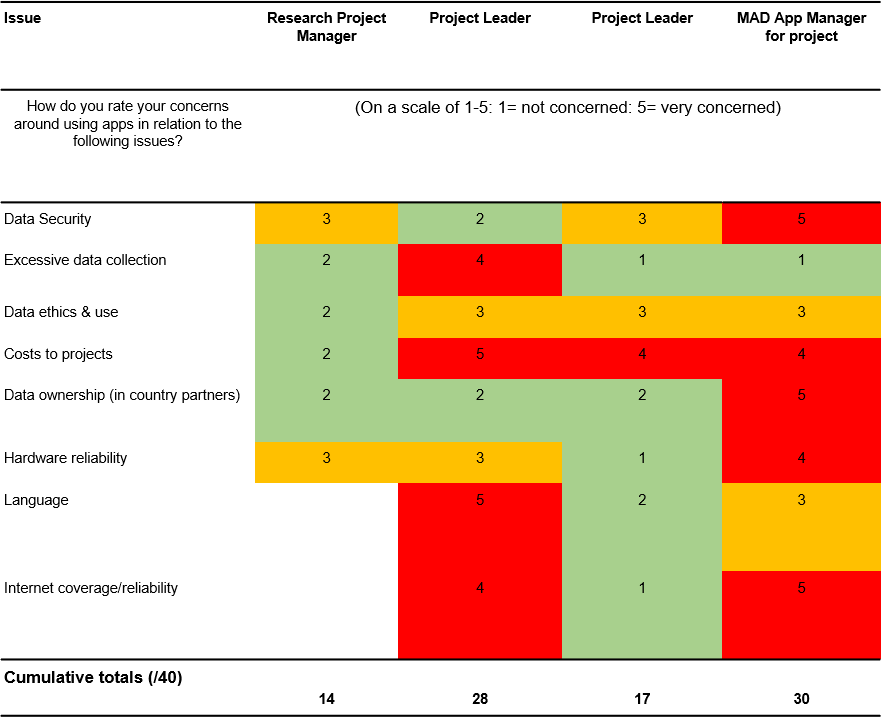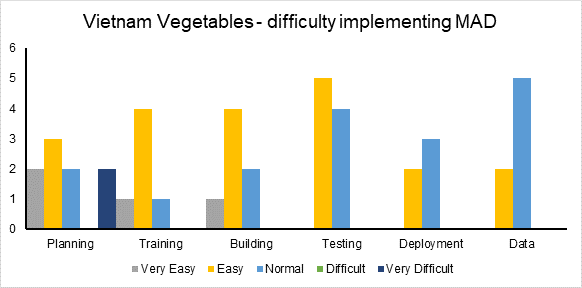Research Activities
This 'Vietnam Vegetables' project aimed to assess the profitability and sustainability of smallholder vegetable farmers in North Western Vietnam. The project worked to improve engagement between vegetable producers and urban markets to allow smallholder access to higher-value markets. Surveys were used to collect data on urban markets to allow smallholder access to higher-value markets. Surveys were used to collect data on urban market consumption patterns which would be used to help market local vegetables. The project was managed by the Centre for Global Food and Resources at the University of Adelaide led by Dr Dale Yo, with MAD implementation led by Prof Wendy Umberger, Mr Christian Genova and Mrs Jesmin Rupa.
More information about the overall project can be found on the ACIAR website http://aciar.gov.au/project/agb/2012/059
Initial Perceptions
"Is that technology going to work in some of the very basic settings that we're working in?" - Dr. Wendy Umberger, Project Leader
At the beginning of the process, Vietnam Vegetables project leader Professor Wendy Umberger was most concerned that it would involve a steep learning curve which would translate to high costs. There were also concerns around how the application would be translated into local languages, and whether they would perform properly in very remote locations. Project staff expected increase efficiency in data analysis from adopting MAD. There was also some excitement about the digital capacity building of researchers and enumerators. Project staff allocated the task of developing and managing the mobile apps were the most concerned at the beginning of the project. In particular, they foresaw issues around data security and internet coverage.

MAD Activities
As part of the MAD Research Series, Oikoi worked with the project staff to digitise two large household surveys into mobile applications for data collection. Each of these surveys had a sample size of 2500 households (5,000 in total). Both surveys were adapted from paper-based questionnaires previously used by researchers which had taken 5 hours to complete per household. They were comprehensive and the application designs were complex. The minimum time for each questionnaire was 3 hours.
Designing and building the app
The project outsources app development for one of the surveys to a third party organisation. For the second survey, the app was initially designed in excel by project staff in 5 days after one day of planning with assistance from Oikoi technical staff.
Testing the apps
Despite planning for several rounds of testing prior to deploying the survey mobile application, testing and feedback was limited up until a few weeks before deployment. In those final weeks, over 1500 ad-hoc requests for changes to i) workflow, ii) questions, and iii) translations were sent to Oikoi.
Monitoring app use
Project staff trained the contracted survey enumerators for three days prior to deployment and included training in using the app. The project team then monitored the incoming data on a daily basis and followed up issues with the enumerators - making use of a key advantage in mobile acquired data. Data monitoring during fieldwork also allowed the field team to prepare daily progress reports via email to the project lead.
Benefits and Challenges
”It’s allowed us to do checks on the data as it’s coming in so it’s not 6 weeks after the data was collected when it’s getting entered.” - Prof Wendy Umberger
The benefits from MAD adoption in this project included reduced interview time (by 2 hours per household, equivalent to over 1250 working days in total), faster data input for analysis, reduced data loss, increased digital capacity building in-country, and better monitoring and support during fieldwork.
The adoption of MAD required greater time costs upfront for project staff in building and testing the survey apps. The app that was outsourced to a third party for development was only delivered 5 days before enumerator training, and had significant issues that had to be addressed in the short period and took up a lot of project staff time. The contracted enumerator company was not used to using household ID numbers that were generated from the app and some incorrectly recorded ID using their internal systems instead - leading to manual updating of data.
Financial and Time Costs
Time
The ‘Vietnam Vegetables’ project had staff with high level of technical skills, making them particularly well suited to adopting digital data collection. Based on user feedback, the project staff seemed to manage adoption of mobile acquired data well. Most reported all stages of the process as being either ‘easy’ or ‘normal’. Project staff spent a total of 94 days adopting mobile acquired data (including support days provided by Oikoi. Some of the time saved during survey fieldwork was balanced by increased workloads to develop the survey app ahead of fieldwork. In total, project staff spent a total 65 working days on the app development, 75% pf which was spent on building and testing the applications

Financial
Operating costs in adopting MAD were reported by the project as AU $7,344. This largely covered the cost of mobile devices used in the MAD surveys. Support services from Oikoi were covered by ACIAR and not counted in adoption costs.






